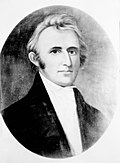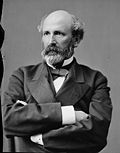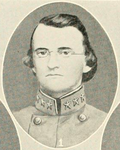North Carolina Attorney General
Attorney general for the U.S. state of North Carolina From Wikipedia, the free encyclopedia
The attorney general of North Carolina is a statewide elected office in the U.S. state of North Carolina. The attorney general is a constitutional officer responsible for representing state agencies in legal matters, supplying other state officials and prosecutors with legal advice, and leading the North Carolina Department of Justice. The incumbent attorney general, Jeff Jackson, assumed office on January 1, 2025. The position of attorney general dates back to North Carolina's colonial history. North Carolina's 1776 constitution established the office as an official appointed by the North Carolina General Assembly. The state's 1868 constitution made the attorney general an elected executive official with their duties prescribed by law. Since 1971, the officer has sat on the North Carolina Council of State.
| Attorney General of North Carolina | |
|---|---|
 Seal of the attorney general | |
| Member of | Council of State |
| Term length | Four years |
| Inaugural holder | Waightstill Avery |
| Formation | 1776 |
| Succession | Seventh |
| Salary | US$157,403 annually |
| Website | ncdoj |
History
Summarize
Perspective
The title "Attorney General" was used in the colonial territory encompassing what became North Carolina as early as 1677, when George Durant was appointed by Governor John Jenkins.[1] In 1697 the British Crown appointed an attorney general for the entire Province of Carolina;[2] such attorneys general would serve the entire province until it was split into the provinces North Carolina and South Carolina and both received their own attorneys general. The attorneys general in North Carolina and other British American colonies served as representatives of and exercised the same powers as the British attorneys general.[3] The last colonial attorney general, Thomas McGuire, was appointed in 1767 and, according to the Office of the North Carolina Secretary of State, "presumably" served until the outbreak of the American Revolution.[4]
Following the start of the revolution, the new states of the United States ratified constitutions, most of which provided for the position of attorney general. The Constitution of North Carolina, ratified on December 18, 1776, established the office in Article XIII. Under the article, the attorney general was to be appointed by the North Carolina General Assembly and to serve as long as they maintained "good behavior", similar to judges.[5] Like other state attorneys general, North Carolina's officer exercised authority derived from English common law, colonial traditions, and state laws.[6] The first attorney general for the independent state of North Carolina was Waightstill Avery, who served from 1777 to 1779.[7] The General Assembly placed significant limits on the attorney general's authority, appointing their deputies and, by 1806, curtailing their ability to prosecute cases to one of six specified jurisdictions in the state.[5]
The 1868 constitution made the attorney general an elected member of the executive branch.[5] Under this framework, the attorney general served as the legal advisor to the North Carolina Council of State, but was not formally one of its members.[8] The constitution made the attorney general an ex officio member of the State Board of Education[9] and provided for the officer's duties to be determined by law. That year, the General Assembly prescribed eight statutory duties for the attorney general: defending the state's interests in legal matters, representing government agencies upon request, advising local prosecutors, delivering an annual report to the legislature, summarizing reports from local prosecutors, providing legal advice to the legislature and other government agencies, delivering funds to the state, and maintaining a record of their office's accounts.[6] Most prosecutions for criminal offenses were made the responsibility of district solicitors.[10]
The state's new constitution in 1971 altered the attorney general's office and duties little, though it made the officer a full member of the Council of State and removed them from the State Board of Education.[11] The North Carolina Department of Justice—combining the Office of the Attorney General, the State Bureau of Investigation (SBI), the General Statutes Commission, and the police information network—was created by the General Assembly in 1971.[12][13] In the early 1970s, incumbent Robert Burren Morgan shifted the office's emphasis from government legal matters and law enforcement towards consumer protection, and raised its political profile by forming relationships with the governor, the General Assembly, and other states' attorneys general.[14] In 1984, a referendum approved an amendment to the constitution to require that the attorney general be licensed to practice law in North Carolina.[15] In 2014, the SBI was removed from the attorney general's purview and made an independent agency responsible to the governor.[16][17] The incumbent attorney general, Democrat Jeff Jackson, assumed office on January 1, 2025.[18]
Powers and duties
Summarize
Perspective
Article III, Section 7, of the Constitution of North Carolina stipulates the popular election of the attorney general every four years.[19] The office holder is not subject to term limits.[20] In the event of a vacancy in the office, the Governor of North Carolina has the authority to appoint a successor until a candidate is elected at the next general election for members of the General Assembly. Per Article III, Section 8 of the constitution, the attorney general sits on the Council of State.[19] They are seventh in the line of succession to the governor.[21][22] As with all Council of State officers, the attorney general's salary is fixed by the General Assembly and cannot be reduced during their term of office.[23] In 2023, the attorney general's annual salary was $157,403.[24]
The attorney general serves as the state government's top legal officer.[25][26] Their duties and responsibilities are mostly enumerated in North Carolina's general statutes.[11] Their duties include providing legal representation to all state agencies; supplying advice upon request to judges, magistrates, and county and city attorneys in accordance with the American Bar Association Model Rules of Professional Conduct; and addressing appeals to state trial court verdicts. The attorney general may initiate legal action in the public interest or intervene in proceedings before any federal and state courts, regulatory officers, agencies or bodies on behalf of the state.[27] The attorney general is restricted by law from contravening the stances of the General Assembly in court proceedings or arguing that its actions are unconstitutional.[28]
Per statute, the attorney general renders nonbinding legal opinions upon questions of law submitted by the General Assembly, the governor, or any other state officer.[27][29][a] Despite their role as the top legal representative for the state, attorneys' general views are often passed over by governors, who frequently seek the advice of their appointed legal counsel.[26] Generally, the attorney general cannot give legal advice to private entities.[27] The General Assembly has also affirmed that the attorney general has power vested in them by common law tradition, as long as such authority is exercised in a manner consistent with state laws and the constitution.[32] The Supreme Court of North Carolina has not delineated the scope of the officer's common law authority, though it has ruled that this bestows upon the attorney general a "duty to prosecute all actions necessary for the protection and defense of the property and revenue of the sovereign people of North Carolina."[33] The attorney general is forbidden by law from assuming the stance in court litigation that any segment of state legislation is unconstitutional.[34]
The attorney general leads the North Carolina Department of Justice[25] and appoints its director.[35] It is in charge of the state crime lab.[36] They cannot prosecute cases themselves unless asked to do so by a local district attorney. The attorney general does not have any authority over courts, local district attorneys, or local law enforcement agencies.[27]
Political trends and dynamics
Historically, most North Carolina attorneys general have been Democrats.[37] As of 2024, the last Republican to win election to the office was Zeb V. Walser in 1896. Republican James H. Carson Jr. was appointed to the office in 1974 to fill a vacancy and served for several months.[38]
Beginning in 1968, every Democrat elected to the attorney general's office has eventually campaigned to be elected governor except for Morgan, who was elected to the U.S. Senate in 1974. As of 2024, three of them, Mike Easley, Roy Cooper, and Josh Stein were successful, while two others were unsuccessful.[38][39]
List of attorneys general
Elected by the legislature
| No. | Attorney General | Term in office | Source | |
|---|---|---|---|---|
| 1 | Thomas McGuire | 1767 – 1776 | [7] | |
| 2 | Waightstill Avery | 1777 – 1779 | [7] | |
| 3 |  |
James Iredell | 1779 – 1782 | [7] |
| 4 |  |
Alfred Moore | 1782 – 1791 | [7] |
| 5 |  |
John Haywood | 1792 – 1795 | [7] |
| 6 | Blake Baker Jr. | 1795 – 1803 | [7] | |
| 7 |  |
Henry Seawell | 1803 – 1808 | [7] |
| 8 |  |
Oliver Fitts | 1808 – 1810 | [7] |
| 9 |  |
William Miller | 1810 | [7] |
| 10 |  |
Hutchins Gordon Burton | 1810 – 1816 | [7] |
| 11 | William P. Drew | 1816 – 1824 | [7] | |
| 12 | James F. Taylor | 1825 – 1828 | [7] | |
| 13 |  |
Robert H. Jones | 1828 | [7] |
| 14 |  |
Romulus Mitchell Saunders | 1828 – 1834 | [7] |
| 15 | John Reeves Jones Daniel | 1835 – 1841 | [7] | |
| 16 | Hugh McQueen | 1841 – 1842 | [7] | |
| 17 | Spier Whitaker | 1842 – 1846 | [7] | |
| 18 |  |
Edward Stanly | 1846 – 1848 | [7] |
| 19 |  |
Bartholomew F. Moore | 1848 – 1851 | [7] |
| 20 | William Eaton Jr. | 1851 – 1852 | [7] | |
| 21 |  |
Matt Whitaker Ransom | 1853 – 1855 | [7] |
| 22 |  |
Joseph B. Batchelor | 1855 – 1856 | [7] |
| 23 |  |
William Henry Bailey | 1857 | [7] |
| 24 | William A. Jenkins | 1857 – 1862 | [7] | |
| 25 |  |
Sion Hart Rogers | 1863 – 1868 | [7] |
Popularly elected
| No. | Attorney General | Term in office | Party | Source | |
|---|---|---|---|---|---|
| 26 | William M. Coleman | 1868 – 1869 | Republican | [7] | |
| 27 | Lewis P. Olds | 1869 – 1870 | Republican | [7] | |
| 28 | William Marcus Shipp | 1870 – 1873 | Democratic | [7] | |
| 29 |  |
Tazewell L. Hargrove | 1873 – 1877 | Republican | [7] |
| 30 |  |
Thomas S. Kenan | 1877 – 1885 | Democratic | [7] |
| 31 |  |
Theodore F. Davidson | 1885 – 1893 | Democratic | [7] |
| 32 |  |
Frank I. Osborne | 1893 – 1897 | Democratic | [40] |
| 33 |  |
Zeb V. Walser | 1897 – 1900 | Republican | [40] |
| 34 |  |
Robert Dick Douglas | 1900 – 1901 | Republican | [40] |
| 35 |  |
Robert D. Gilmer | 1901 – 1909 | Democratic | [40] |
| 36 |  |
Thomas Walter Bickett | 1909 – 1917 | Democratic | [40] |
| 37 |  |
James S. Manning | 1917 – 1925 | Democratic | [40] |
| 38 |  |
Dennis G. Brummitt | 1925 – 1935 | Democratic | [40] |
| 39 |  |
Aaron A. F. Seawell | 1935 – 1938 | Democratic | [40] |
| 40 |  |
Harry McMullan | 1938 – 1955 | Democratic | [40] |
| 41 |  |
William B. Rodman Jr. | 1955 – 1956 | Democratic | [41] |
| 42 |  |
George B. Patton | 1956 – 1958 | Democratic | [40] |
| 43 |  |
Malcolm B. Seawell | 1958 – 1960 | Democratic | [40] |
| 44 |  |
T. Wade Bruton | 1960 – 1969 | Democratic | [40] |
| 45 |  |
Robert B. Morgan | 1969 – 1974 | Democratic | [40] |
| 46 |  |
James H. Carson Jr. | 1974 – 1975 | Republican | [40] |
| 47 |  |
Rufus L. Edmisten | 1975 – 1985 | Democratic | [40] |
| 48 |  |
Lacy Thornburg | 1985 – 1993 | Democratic | [40] |
| 49 |  |
Mike Easley | 1993 – 2001 | Democratic | [42] |
| 50 |  |
Roy Cooper | 2001 – 2017 | Democratic | [43] |
| 51 |  |
Josh Stein | 2017 – 2025 | Democratic | [44] |
| 52 |  |
Jeff Jackson | 2025 – present | Democratic | [18] |
Notes
- The attorney general's office states that its advice "should be complied with by [s]tate agencies and officials."[30] On sporadic occasions when the attorney general has felt unable to provide a suitable opinion, they have redirected questions for advice to the justices of the North Carolina Supreme Court.[31]
References
Works cited
External links
Wikiwand - on
Seamless Wikipedia browsing. On steroids.

